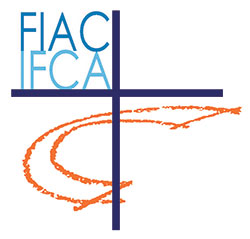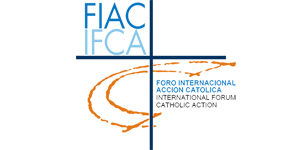Final document
III European-Mediterranean Continental Meeting
FOR A FRATERNAL EUROPE. The contribution of Catholic Action •Sarajevo, September 3rd-7th 2003
The Third IFCA-FIAC (International Forum of Catholic Action) European-Mediterranean Meeting was held in Sarajevo (capital city of Bosnia Hersegovina) from the 3rd to the 7th September 2003 on the theme: “For a Fraternal Europe”.
The Cardinal Archbishop of Vrhbosna-Sarajevo, HE Card. Vinko PULJIC presided over the opening session during which HE Mgr.Francesco Lambiasi, General Assistant of the Italian Catholic Action and of IFCA, and Beatriz Buzzetti Thompson, IFCA’s Coordinator greeted the participants.
The meeting was also attended by the Bishop of Banja Luka HE Mgr.Franjo Komarica, who is also President of the Bishops’ Conference of Bosnia Hersegovina, the Auxiliary Bishop of Sarajevo, HE Mgr. Pero Sudar as well as HE Mgr.Atilano Rodriguez, Bishop of Ciudad Rodrigo and Bishop Assistant of Catholic Action in Spain.
Representatives and those responsible for Catholic Action in 11 countries took part in the meeting: Argentina, Austria, Bosnia Hersegovina, Croatia, Hungary, Israel, Italy, Malta, Moldovian Republic, Romania and Spain.
In this city, which is the symbol of peace and which we all love, and in actual fact at Sarajevo’s Seminary, where the presentations and the working sessions were held, we implored the Lord of Peace to enlighten the way, which thanks to the action of the Holy Spirit, we are taking in the building of Europe: a Europe of peace, a Europe where justice reigns, a Europe where fraternity is lived.
Mgr. Komarica, Mgr.Sudar and Mgr.Majic, parish priest of Mostar, gave us a complete description of the situation in the country which helped us to understand the very difficult and complex situations which the people and the Catholic Church have to live. This highlighted the importance of this international meeting as this sensibilized us all the more towards a Europe which is to be more open and welcoming, a Europe built on solidarity.
On the 4th September in the afternoon, Ilaria Vellani and Alexandru Cistelecan, representatives of Catholic Action in Italy and Romania respectively, both spoke about “problems which unite us” in their interventions. In this analysis of reality, they raised points for discernment and themes for discussion on which comments were also made in the plenary session. In general they identified: faith, culture, history, hope, globalization, ecumenism, immigration and new evangelization.
Globalization of solidarity was highlighted as being a positive element together with the awareness of the fact that in the building of a fraternal Europe hope is another indispensable element in our life together. Our true witnessing testifies the love of God which fills our hearts. This is a challenge which is not void of suffering and entails a great effort and sacrifice. It is a challenge which looks at the living Christ: yesterday, today and always.
Friday 5th September, the French Benedictine monk, Fr. Ghislain Lafont gave a presentation about “The future is in our roots: the novelty of the Gospel in Europe of the third millennium”. Basing his talk on the documents of Vatican II and the more recent Ecclesia in Europa, he outlined important attitudes for the novelty required for the building of this continent: reconciliation, dialogue and the Beatitudes. He urged us to live a spirituality based on the Sacraments and on a familiarization with the living Word. If we live a sacramental life and concretize the Word, we will be helped to overcome fear, diversity and all that which separates us. It also helps us to open new ways which get us nearer to each other such as pardon, meekness, ability to listen to each other and comprehension. All this entails a great deal of self renunciation which makes us come out of ourselves to give ourselves to the others.
Lastly he referred to patience as the basic attitude in this process and recommended the daily, personal and communitarian practice of love. This can only come about if only we make the Gospel the Good News for all.
Saturday 6th September was dedicated more concretely to Catholic Action. In the light of the encouragement of His Holiness John Paul II “Duc in altum! Catholic Action” a series of interventions, which were later studied more in depth in small working groups and on which conclusions and final proposals were drawn up, were made.
-Mgr. Atilano Rodriguez, from his experience in Catholic Action in Spain, spoke about the theme “Why the Church needs CA”. Briefly it may be said that the reason is that CA assumes the very same aim of the Church which is evangelization. In order that this evangelization may bear fruit in today’s Europe, CA should have two fundamental bases: spirituality and formation, together with a close accompaniment of its members by some bishops and priests. – Beatriz Buzzetti spoke about “The features of conciliar CA for the third millennium”. As a result of the fact that we are all baptized and considering the four characteristics with which the Vatican Council describes CA, CA should be spread in all places and in all spheres of life with its typical formative style, which is based on communion, correlation between faith and daily living, knowledge of the social teaching of the Church and an incarnated spirituality, as stated in Christifideles Laici.
– Beatriz Pasqual from the Spanish CA described CA as a school for the formation of lay people, a seminary of lay sanctity and looked at formation as being a life-long process.
– Maria Giovanna Ruggieri from the Italian CA dealt with the relation which should prevail between the parish and CA, highlighting the contribution which this lay association can give to make the parish an authentic missionary community open to new challenges.
– Oana Tuduce from the Romanian CA spoke about the complex religious and cultural situation in her country and her experience as a young woman, stressing the indispensable fact that CA should be organized at national level and the question of the emigration of Romanian youths to other countries.
A fraternal climate prevailed throughout the meeting and this was greatly enhanced by the prayers and Eucharistic celebrations held together. Moments of relaxation were not lacking. Our visits to the city gave us the opportunity to discover its beauty inspite of the signs of violence still evident.
We would like to express our appreciation to the Catholic community of Sarajevo for the attention given to us during these days. We will treasure deeply in our hearts their warm welcome, their testimony and their love.
In conclusion, three fundamental aspects were elaborated upon such that we may promote further our being CA.
FORMATION
It is the fundamental choice, that of linking faith with daily living, a formation aimed at the whole person and with Christ as the centre of lay people in CA. This formation requires animators and priest assistants prepared to accompany children, youths and adults in the different stages and the various spheres in life.
THE PARISH
The basic place of CA’s communitarian life should win back the beautiful image given to it by Blessed John XXIII who defined it as “the fountain of the village”. The parish should be missionary communion, open to all the needs of the persons living therein and having a diocesan and world dimension.
YOUTH
They are persons with a right and a duty to be protagonists in their history through action and decision making. Young people should be given attention in the present. They need persons who listen to them, who support them and who share their lives.
As a result of the three workshops on the themes, the following suggestions were made to IFCA:
FORMATION
– build a data base at IFCA’s head office of all the material which the different countries use as regards formation. The different countries are to assume the task of sending this material.
– draw up guiding material which can orientate group animators.
– organize a European meeting on ecumenism.
THE PARISH
– make a reflection about the laity and prepare a basic itinerary for the study and knowledge of the Council and the Church’s teachings.
– exchange of experiences
YOUTH
– contact and exchanges among the different countries
– launching of an IFCA Youth Department
IFCA is the place for meeting and for solidarity. During these few days we have all lived the richness of the experiences which we have brought with us from the East and from the West. IFCA also urges us to feel ourselves as the people of God and to be active members of the Church and desires that CA may contribute towards helping lay people to live their vocation.
- rsris_slide_link:
- wps_subtitle:
- pl_view_post:
- 1008








